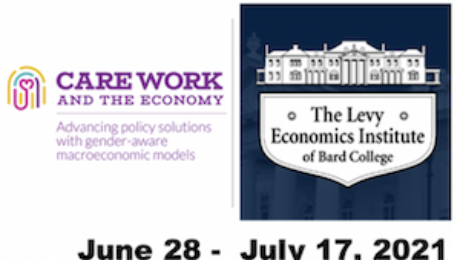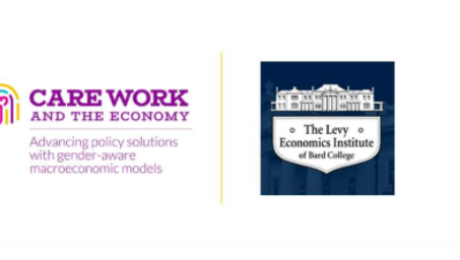Innovations in Gender-Aware Macroeconomic Models
Macroeconomic models are in general not fully gender aware, instead often grouping individuals regardless of gender. However, many studies have found that women and men have different economic and social preferences, caring and spending behaviors, and lifestyle attitudes. It is thus important to incorporate components into models to account for gendered differences and explain economic dynamics of gender gaps in care work, labor force participation, and growth.
Studies conducted as part of the Care Work Economy and Gender-Aware Macroeconomic Modelling for Policy Analysis (CWE-GAM) Project have found innovative ways to introduce gender-aware components into macroeconomic models to fill gaps in the existing literature.
Modeling Aggregate Demand and Supply: Growth & Gender
Braunstein et al. (2019) modeled the interaction between aggregate demand and supply to analyze the causality between growth, gender inequality, and social reproduction. The authors studied four country regime-types: 1) time squeeze, 2) mutual, 3) wage squeeze, and 4) exploitation (see Table 3).

“By proposing that we treat labor as a resource that is produced, the model and estimates presented illustrate how care and social reproduction can have macroeconomic consequences independent of their effects on women’s work participation, and that the gendered structures of care provisioning are elemental to paths for development and growth.”
Braunstein and Tavani (2020) additionally studied country circumstances through “evaluating the equilibrium effects (on gender wage equality, output, and investments in care) of three interventions for gender equality: the direct provision of public care services that increase women’s paid employment; the provision of cash allowances that increase women’s take- up of market-provided or private care services; and an increase in women’s participation in paid labor.”
“The setup focuses on the rate of capacity utilization as a measure of economic activity and gender wage equality as a measure of income distribution:
- The producer’s equilibrium features a direct relationship between economic activity and gender wage equality.
- The goods market equilibrium can be either care-led or inequality-led, depending on the relationship between labor’s share of income and demand for investment in human capacities versus investment in physical capital.”
They have found that higher gender wage equality and output have divergent outcomes for labor shares that manifest in differing investments in care. However, gender wage equality improves in both cases.
Gender-Aware SAM & CGE Model: Growth, Fiscal Policies, Norms & Gender
Studies argue that production activities, labor factors, and representative households be disaggregated in the SAM (Fontana et al. 2020). Lofgren et al. (2020) extend a SAM for gender and care analysis in Korea “to cover household (non-GDP) service production; and its single household was disaggregated into three types, defined to differ in care needs: households with children with head in working-age; households without children with head in working age; and households with the head above working age.”
Fontana et al. (2020) emphasize the need for:
- Labor factors to be disaggregated by gender, skill, age, place of residence, immigration status to capture intersectionality;
- Representing the non-market care sector and its interaction with market sectors;
- Modeling women’s constraints (e.g. care-related social protection and care provision) over the life-cycle through dynamic CGGEs.
Gonzalez Garcia et al. (2020) constructed a model with long-term care and gender, underlining that social norms are endogenous to policies. “Patriarchal norms in particular prevent a fairer distribution of housework and care work, even if the gender wage gap falls. The unfair division of unpaid care work in turn increases the gender wage gap and creates gender-unequal equilibrium outcomes.”
“One of the key pillars for reducing and redistributing unpaid care work is the role of public investment in quality care services and care relevant infrastructure […] Improving the productivity in the care sector is needed to decrease the households’ effective costs of purchasing paid care services” (Gonzalez Garcia et al. 2020).
Workers must be allowed to be caregivers while continuing their professional achievements. Recommended policies include:
- Tax-funded paid parental leave for fathers as well as mothers
- Flexible work hours
- Paid family leave
- Creation of workplace cultures respecting the caregiving responsibilities of women and men
This blog was contributed by Aina Krupinski Puig, Research Assistant for the Care Work and the Economy project.
References:
Braunstein, Elissa, Stephanie Seguino, and Levi Altringer. (2019). “Estimating the Role of Social
Reproduction in Economic Growth.” Care Work and the Economy (CWE-GAM), Program on Gender Analysis in Economics (PGAE), American University. https://doi.org/10.17606/RV6P-6F66.
Braunstein, Elissa, and Daniele Taviani. (2020). “Gender Wage Equality and Investments in
Care: Modeling Equity and Production.” Care Work and the Economy (CWE-GAM), Program on Gender Analysis in Economics (PGAE), American University. https://doi.org/10.17606/KR5J-M452.
Fontana, Marzia, Binderiya Byambasuren, and Carmen Estrades. (2020). “Options for Modeling
the Distributional Impact of Care Policies Using a General Equilibrium (CGE) Framework.” Care Work and the Economy (CWE-GAM), Program on Gender Analysis in Economics (PGAE), American University.https://doi.org/10.17606/G155-C715.
Gonzalez Garcia, Ignacio, Bong Sun Seo, and Maria Floro. (2020). “Norms, Gender Wage Gap
and Long-Term Care.” Care Work and the Economy (CWE-GAM), Program on Gender Analysis in Economics (PGAE), American University. https://doi.org/10.17606/7E2K-1508.
Lofgren, Hans, Kijong Kim, Marzia Fontana, and Martin Cicoweiz. (2020). “A Gendered Social
Accounting Matrix for South Korea.” Care Work and the Economy (CWE-GAM), Program on Gender Analysis in Economics (PGAE), American University. https://doi.org/10.17606/T5MZ-7M49.
- Published in Economic Modeling, Gender-Aware Macromodels, Macroeconomics, Policy, Social Care Systems, Unpaid Care Work
Last Call for Applications! An Intensive Virtual Course in Gender-Sensitive Macroeconomic Modelling June 28-July 17, 2021
Organized by the American University’s Care Work and the Economy Project and Levy Economics Institute of Bard College
The purpose of this course is to engage with fellow economists to enhance capacity building in research and teaching of gender-sensitive economic analysis, with a focus on care and macroeconomic policy aspects. The course will be built on four pillars: a) understanding and measuring the care economy; b) adapting social accounting matrices to account for paid and unpaid care activities; c) integrating the information from time-use surveys on unpaid care activities with other relevant sources of information such as national income accounts, labor force surveys and household or special surveys; and d) performing policy-relevant economic analyses that take systematic account of the interlinkages between care, macroeconomic processes, and distribution.
We encourage economists in academia, research institutions, government, and civil society organizations to apply. The applicants must have completed at least two years of study in a graduate economics program or have received a Masters’ or Ph.D. degree in economics. The course will be conducted over three weeks. Five days a week, students are expected to do the required reading and then meet virtually with instructors and fellow students. We estimate that the required reading will take at least an hour for most participants. Each meeting consists of an hour of lecture followed by an hour of group discussion or exercises guided by instructors. Sessions will be held daily over three weeks between 10 am and 12:15 pm (EDT, GMT, and ICT
The deadline for applications is April 8, 2021. We will communicate the decision on participation by May 8, 2021. If you require further information regarding the course, please contact: the AU-Levy Intensive Course Administrator, Thomas Masterson (masterso@levy.org), cc: Care Work and the Economy (CWE-GAM) Project Manager, Shirin Arslan (sarslan@american.edu).
This course is made possible by the generous support of the William and Flora Hewlett Foundation.
Please submit your application package via the form at this link. Email Thomas Masterson if you have any questions at: masterso@levy.org.
The application package should be a single PDF document. It should contain:
- Current curriculum vita that includes the following:
- Personal information: name, address, date of birth, nationality, and sex.
- Educational background: institutions attended beginning with the current or most recent; and degree awarded in each institution.
- Employment: list of employers beginning with the current or most recent; and, brief description of the position held and responsibilities at each job.
- Language proficiency: native language, whether English was a medium of instruction, and score in English proficiency test, if applicable.
- Sample of written academic work in English.
- Personal statement (under 750 words): a brief description of the applicant’s background, experience, and motivation for taking the course.
- For applicants currently enrolled in a Ph.D. program or with a Ph.D. or M.A. degree in the last two years, a copy of their transcripts in the Ph.D. or the M.A. program.
Letter of recommendation from someone familiar with the applicant’s training in economics.
UPDATE: INTENSIVE COURSE IN GENDER-SENSITIVE MACROECONOMIC MODELING FOR POLICY ANALYSIS
The Intensive Course in Gender-Sensitive Macroeconomic Modeling for Policy Analysis to be held at the Levy Economics Institute of Bard College (Blithewood, Annandale-on-Hudson, NY) in July 2020 has been postponed to July 2021.
The decision was made by the organizing committee, in consideration of the health and safety of both participants and instructors, as well as assessments of current and potential travel restrictions in the U.S. and around the world.
The July 2021 Course will be held at the Levy Economics Institute, exact dates and details will be posted in future announcements. We expect to provide more specific information by Fall 2020. Please continue to visit the Care Work and the Economy website and the Levy Economics Institute website and follow @careworkeconomy on Twitter for future announcements about the course.
The Organizing Committee of the Intensive Course in Gender-Sensitive Macroeconomic Modeling for Policy Analysis would like to thank each of the 160 applicants received from 40+ countries. If you have further questions about the course, please don’t hesitate to reach out to the Care Work and the Economy project at American University (careworkeconomy@american.edu).



